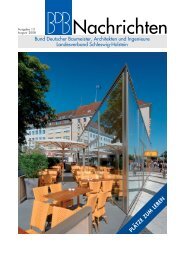Nachrichten - Bund deutsche Baumeister Landesverband Schleswig ...
Nachrichten - Bund deutsche Baumeister Landesverband Schleswig ...
Nachrichten - Bund deutsche Baumeister Landesverband Schleswig ...
Erfolgreiche ePaper selbst erstellen
Machen Sie aus Ihren PDF Publikationen ein blätterbares Flipbook mit unserer einzigartigen Google optimierten e-Paper Software.
Stadtplaner<br />
Léon Krier<br />
Currículum vitae<br />
Léon Krier wurde 1946 in Luxemburg<br />
als Sohn eines Schneiders und einer Pianistin<br />
geboren. 1967 studierte er ein<br />
Jahr lang Architektur an der Universität<br />
in Stuttgart und arbeitete von 1968 bis<br />
Poundbury ist ein Beispiel zur<br />
Umsetzung der Grundsätze der<br />
nachhaltigen Entwicklung von<br />
Stadten. Léon Krier erstellt im<br />
Auftrag von Prince Charles den<br />
Masterplan. Im Rahmen des Architektur-Forums<br />
schilderte Krier<br />
sehr lebendig und anschaulich<br />
seine Vorstellungen von Stadtplanung.<br />
Für diese Ausgabe der BDB-<br />
<strong>Nachrichten</strong> hat der international<br />
anerkannte Architekt uns<br />
freundlicherweise den folgenden<br />
Text zur Verfügung gestellt.<br />
Zum Text veröffentlichen wir einige<br />
Skizzen aus seinem Buch<br />
„Freiheit oder Fatalismus“, welches<br />
1998 im Prestel-Verlag erschienen<br />
ist.<br />
BDB <strong>Nachrichten</strong> – 11/Februar 2006<br />
1974 im Londoner Atelier von James<br />
Stirling. Als Dozent für Architektur und<br />
Urbanistik lehrte er an der Architectual<br />
Assosiation und am Royal College of<br />
Arts in London, 1974 – 1977 an der<br />
Princeton University, 1982 als Jefferson-<br />
Professor an der Virginia University,<br />
1990 – 1991 als Davenport-Professor<br />
an der Yale University.<br />
Er verwirklichte Projekte in Luxemburg,<br />
Frankreich, Italien, Spanien, Dänemark,<br />
Deutschland, Portugal, in den<br />
USA und England. Als persönlicher Berater<br />
des Prince of Wales entwarf er in<br />
dessen Auftrag den Masterplan zur Entwicklung<br />
der Stadt Poundbury in Dorset.<br />
Weitere Projekte: Möbeldesign für Giorgeti-Italy<br />
seit 1991; 1993 Bebauungsplan<br />
für Florenz-Novoli; 1996 Archäologisches<br />
Museum in Sintra (Portugal)<br />
und Justizpalast in Luxemburg; 1997<br />
Vorstadtzentrum in Alessandria (Italien)<br />
und Village Hall in Windsor (Florida);<br />
2000 die neue Stadt Heuleburg bei<br />
Knokke in Belgien. Er lebt jetzt im Süden<br />
Frankreichs.<br />
INTERNATIONALE STADTPLANUNG<br />
Preise und<br />
Auszeichnungen:<br />
1977 Berlin-Preis für Architektur<br />
1985 Jefferson Memorial Medal<br />
1987 Chicago AIA Award<br />
1995 Europäischer Kulturpreis<br />
2003 Richard H. Driehaus Prize<br />
Ausstellungen:<br />
Weltweit wurden zahlreiche Ausstellungen<br />
über das Werk Kriers veranstaltet,<br />
Einzelschauen u. a.<br />
1985 im Museum of Modern Art in<br />
New York<br />
1991 in der Nieuwe Kerk in Amsterdam<br />
mit „Imago Luxemburgi”<br />
1996 Teilnahme an der Biennale in<br />
Venedig<br />
1998 an der World Arcitecture<br />
Exposition in Nara<br />
Universal Principles To<br />
Build Good Cities<br />
1. Today we can fairly safely affirm<br />
that the city of the future, or more correctly,<br />
the cities of the future, will not<br />
conform to a single and unified vision of<br />
whatever kind.<br />
2. There exist universal principles to<br />
build good cities and villages. They transcend<br />
ages, climates and cultures. They<br />
are essentially anthropological principles,<br />
related to the habitual capacities of<br />
the human skeleton, body and mind.<br />
- streets and squares<br />
- cities, villages and urban quarters<br />
- development programs and plots<br />
- building methods and architecture of<br />
(Quelle: „Freiheit oder Fatalismus“<br />
von Léon Krier, Foto: Internet)<br />
a certain type, size, character,<br />
aesthetic, functional complexity …<br />
are the unrenounceable axioms of urbanism.<br />
They are not to be confounded<br />
with the axioms of suburbanism.<br />
The principles of traditional architecture<br />
and urbanism are not merely historical<br />
phenomena; they can therefore not simply<br />
be declared outdated.<br />
They are practical responses to practical<br />
problems. They are as timeless as<br />
the principles of musical harmony, of<br />
language, of science, of gastronomy.<br />
Modernism’s philosophic fallacy lies in<br />
the infantile ambition to replace the fundamental<br />
principles of traditional archi-<br />
13



